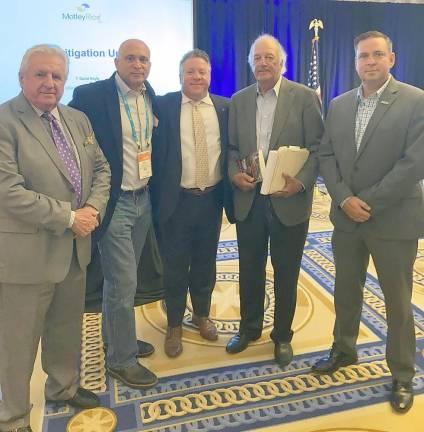‘An opportunity to hold opioid distributors accountable for their unlawful actions’
New York. While the costs of addiction are hard to pin down, Orange County expects to be compensated for the “millions of dollars” in county taxes and payments to non-profits spent to fight addiction.

Orange County will share in the proceeds of a landmark $1.1 billion suit designed to help abate the ongoing scourge of painkiller addiction.
New York State Attorney General Letitia James announced July 20 that the deal had been reached with three of the nation’s biggest drug distributors – McKesson Corporation, Cardinal Health Inc. and Amerisource Bergen Drug Corporation. The settlement follows announcement last month by drug manufacturer Johnson & Johnson to pay the state $240 million and to forego the manufacture of opioids.
Orange County Executive Steven M. Neuhaus and Albany County Executive Dan McCoy, along with New York State Association of Counties Executive Director Stephen J. Acquario, recently met with Joseph Rice of the law firm Motley Rice, national counsel for the opioid litigation team in Washington, D.C. to discuss the pending settlement.
“This is as an opportunity to hold opioid distributors accountable for their unlawful actions, to fight the drug epidemic, and to provide assistance to taxpayers,” Neuhaus and McCoy said in a statement. “With opioid addiction increasing nationwide, we must take advantage of every opportunity to fund education and rehabilitation for our residents.”
They added: “We wanted those responsible to compensate for the public funds our county has had to pay to address opioid addiction.”
Justin Rodriguez, spokesman for Neuhaus, said that the costs of addiction are hard to pin down but certainly amount to “millions of dollars” in county taxes and payments to non-profits.
“For more than two decades, the opioid epidemic has wreaked havoc on countless communities throughout New York and across the rest of the nation, killing hundreds of thousands of our friends and family members and addicting millions more,” the attorney general said in an statement. “And over the course of these past two decades, McKesson, Cardinal Health, and Amerisource Bergen distributed these opioids without regard to the national crisis they were helping to fuel. But today, we’re holding them accountable and delivering more than $1 billion more into New York communities ravaged by opioids for treatment, recovery and prevention efforts.”
Critics: Money is not enough
New York’s settlement was coordinated with a proposed “global settlement” of up to $26 billion with thousands of local governments nationwide. Critics argue that the money is not enough. They also are upset that neither the distributors nor Johnson & Johnson have admitted any wrongdoing. The companies argued that they were distributing a medically necessary product under government regulation. Several governments have already said they would be opting out of the settlement, but New York has accepted it.
An increase in prescription drug overdoses during the pandemic
Orange became the fourth county in New York to join the opioid litigation in 2017. The county has not been notified of its take from the state settlements. Neuhaus declined to comment beyond his statement.
“While no amount of money can bring back those we have lost,” Jayne Conroy of the New York City law firm Simmons Hanly Conroy, private counsel for Orange County and co-lead counsel in the national litigation, said in a statement, “this agreement will help directly fund addiction prevention, education and treatment programs that are so critical to the recovery of our families and the Orange County communities.”
Deaths from increased 37 percent during the pandemic year of 2020. According to preliminary state Health Department figures, overdose deaths in Orange County increased to 102 from 79, for a rate of 26.9. Outpatient emergency room visits rose to 231 from 170 and hospitalizations were up to 51 from 49.
The recent settlements do not end opioid litigation. Several manufacturers are contesting allegations against the at a trial in Suffolk County.